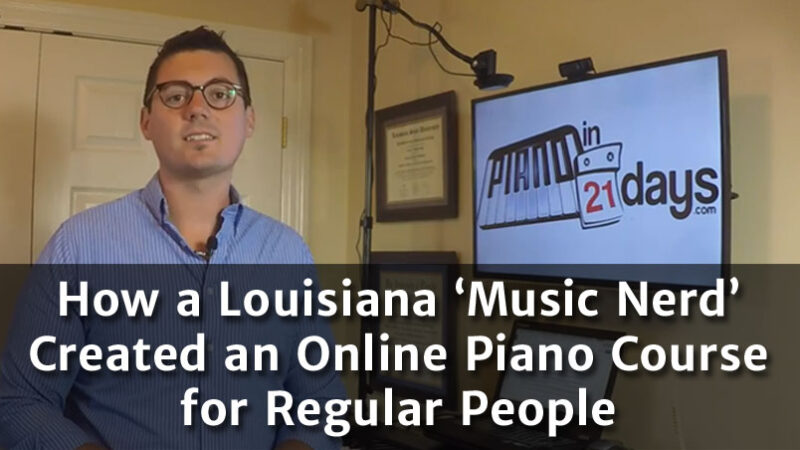
If you had told Jacques Hopkins five years ago that his online piano course business would allow him to leave his full-time job, he never would have believed you. But after eight years of being an engineer, he quit on New Year’s Eve, 2015.
“My daughter just turned one so it’s been amazing working from home and watching her grow up,” he says. “Another cool thing this has allowed us to do is spend three months in France. We rented an apartment to see what it was like. And, of course, I was able to work from there.”
Here’s how he did it…
From the Beginning
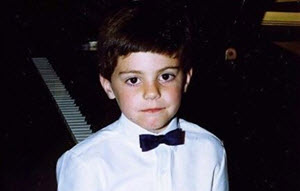
Hopkins started piano lessons at five years old, but never really enjoyed them. Like many kids, he stuck through it as he grew older – mostly to make his parents happy.
He abruptly quit at seventeen, not because he hated the piano, but because he became frustrated with the process.
“I hated the old classical songs my teachers wanted me to play,” he says. “I hated sheet music.”
Soon after, he set out to find a better, faster way to learn to play piano.
An Easier Way
“It took a few years but eventually I was able to fine-tune the process,” he says. “In my early twenties I was having fun on my piano for the first time in my life.”
Being left-brained, he took a more mathematical approach to improving his piano skills. By using the Pareto principle, he distilled the 20% of piano instruction that produces 80% of the results. He felt that he had finally “cracked the code” – and created an efficient shortcut, often with even better results.
Not Your Average Piano Videos
About ten years ago — just for the heck of it — he began posting piano playing videos on YouTube.
His videos featured songs that people didn’t normally play on the piano: “Lips of An Angel” by Hinder, “Hey There Delilah” by the Plain White T’s, and “Black Balloon” by the Goo Goo Dolls.
“I wasn’t just reading some sheet music, I was playing these songs differently than anyone else,” says Hopkins. “One of the videos got over 100 comments with nearly every one of them asking how to play like that. It never occurred to me at the time that there was a market to teach people to play like I did.”
After finishing up his bachelor’s degree in engineering, he stopped uploading piano videos and embarked on a long career as an engineer… or so he thought.
Catching the Entrepreneurial Bug
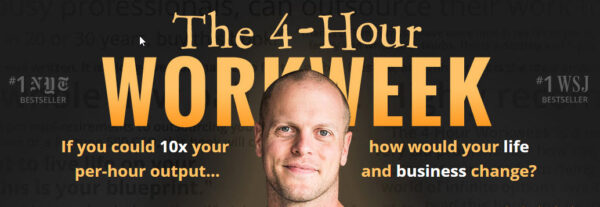
In 2008, Hopkins read “The 4-Hour Work Week” by Tim Ferriss. That started his entrepreneurial wheels turning.
“I’ve always wanted to create some sort of online business that earns passive income,” he says. “I tried various blogs, products, etc, but my problem was always motivation.”
Like most people who try to juggle working full-time with launching an online business, Hopkins soon discovered that there are only a certain number of hours in each day.
“I was still working a demanding job and I just had to prioritize the things that took time in my life,” he says. “I couldn’t quit my job. I still wanted to spend some time with my wife. I didn’t want to stop going to the gym.”
That’s when he got creative, realizing that if he wanted it badly enough he would make the time. “Could I cut out TV? Yes. Could I sleep just a little less? Yes,” he says.
After long days at work, though, he still had trouble motivating himself to work on any sort of side venture. In fact, he would most often procrastinate by playing the piano.
“Rather than doing what I thought I should be doing – working on an internet business in my spare time – I was playing the piano,” he says.
Then all of a sudden it just clicked. He loved playing the piano and had found a unique way to learn to play it quickly. He wondered, “What if this could be my thing?”
Finding a Niche
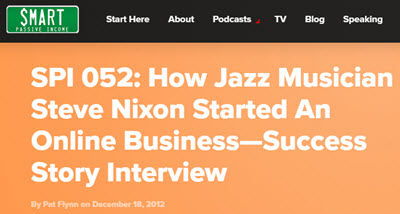
He got the reassurance he needed literally the next day. He was listening to episode 52 of Pat Flynn’s Smart Passive Income podcast featuring Steve Nixon, creator of FreeJazzLessons.com.
Finally, this wasn’t just another guy selling internet marketing products to other internet marketers. Here was someone who was already having success in a niche Hopkins had been thinking about the day before. For the first time in his life, he was confident he could create an online business doing what he enjoyed doing most: playing and teaching piano.
Choosing a Name
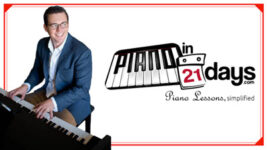
Once he knew he wanted to create an online piano course, he needed a name. He needed to create a brand.
“I tried to think about my hook,” he says. “What was different about the way I would teach people?”
He knew that the majority of people who try learning the piano get frustrated with their slow progress. Knowing that his course would teach them how to play in a fraction of the time, he wanted to include a timeframe element in the name.
“At first it was going to be ‘Piano In 30 Days,’ but there were two reasons I switched it to 21,” he says. “First of all, as I was putting the curriculum together, I just couldn’t come up with 30 days worth of content. Secondly, I had heard about research that suggests it takes 21 days to form a habit.”
Building a Website
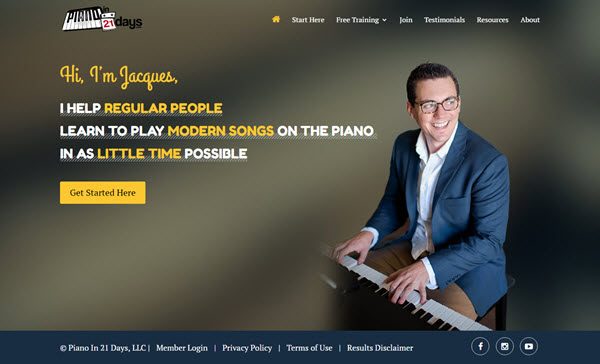
Hopkins had already dabbled in some website design before this project, so he wasn’t entirely new to the process.
“I had created websites before so I already had a HostGator account for the hosting and I knew a little bit about WordPress. That was the easy part,” he says. “The hard part was figuring out how to include a membership feature within the website for my specific needs.”
Creating an Ebook and Course
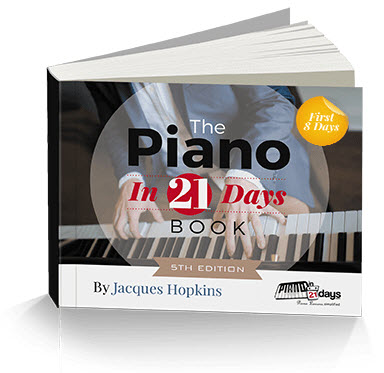 Hopkins knew that he wanted to create both an ebook and a video course in order to have products at different price points.
Hopkins knew that he wanted to create both an ebook and a video course in order to have products at different price points.
“I knew that if I wrote the ebook first, creating the video course would be much easier,” he says. “I also knew that it was important to have an email list, and offering a sample of the eBook could be a good lead magnet.”
For Hopkins – the engineer – breaking down the process step-by-step made it easier to focus on each part and avoid becoming overwhelmed.
“The first thing I did was create an outline of the curriculum which basically meant assigning a topic to each of the 21 days,” he says. “Next, I just starting filling in the content of the lessons with text and images. Once I finished the first 8 days, it seemed like the right amount of information to promote as a freebie in exchange for an email address.”
He signed up for an Aweber account, put together a very basic landing page, and recorded a video announcing that the full ebook and course were coming soon. In the meantime, visitors could enter in their email address to download the first 8 days in a free eBook.
From idea to first sale took him seven or eight months, but the toughest part wasn’t even writing the ebook or coming up with great content.
“The most time consuming part of everything was just researching how to create and market an online course,” he says.
Getting Website Visitors
Like most online course creators, Hopkins realized that building his website was only the beginning. Getting people to actually visit his website was his next big challenge.
“I had to do some marketing to actually get visitors,” he says. “I created a new YouTube channel and uploaded 5 or 6 piano covers and included a call to action at the end of the video saying ‘if you want to learn to play piano like this, head to pianoin21days.com.’ I got my first email opt-in on April 11, 2013 and I was stoked. I got around one email address a week at first.”
The First Sale
A few months later he finished the ebook and began promoting it to his email list.
“My first sale at $23.50 was surreal,” Hopkins says. “For the first time in my life I had made money on the internet.”
These early sales gave him the boost he needed to begin his video course. He set up an overhead camera above his piano and just began recording.
“Between recording and then editing, it took a few days,” he says. “I uploaded the videos to Vimeo Plus and used OptimizePress and OptimizeMember to build out the course on my site.”
YouTube: The Traffic Goldmine
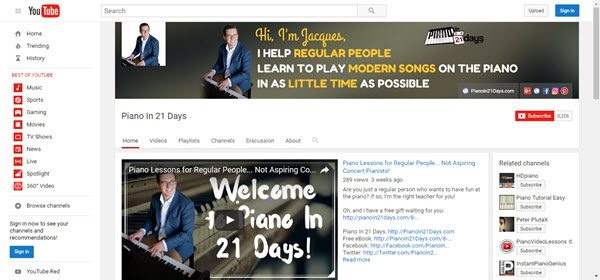
Hopkins says his best source of traffic – far and away – is YouTube. This makes sense as YouTube is one of the top destinations when you want to find out how to do something.
“Most of my traffic comes from the videos I upload to my YouTube channel,” he says. “In fact, I have one video called ‘How to Play Piano – Learn Pop Songs on the Piano in 5 Minutes’ that has nearly a million views and accounts for most of my traffic.”
Hopkins attributes much of his success to the free traffic he receives from the video site and believes that it’s a great trust-building channel right at the beginning of his sale funnel.
Here’s the step-by-step process of how Hopkins converts YouTube viewers into email subscribers:
- A prospective piano student goes to YouTube and searches “how to play piano” or “learn piano fast. Hopkins has videos with titles tailored to each search that show up in the first page of results.
- He builds trust right away by giving his viewer several “quick win” techniques that they can use immediately with their piano.
- At the end of the video (and in the text description) he tells the viewer that there’s a free ebook waiting for them. He gets the click because he’s already provided value and they want to learn more about what he can do to help them.
- On the landing page, the viewer provides their email address in exchange for the free ebook. Once they use the ebook and begin getting results, they want want to learn even more. The student is convinced that the material is useful and that Hopkins is a good instructor.
- Once the autoresponder sequence hits their inbox, piano students soon order his paid premium products because they know, like and trust him and are personally convinced that he can help them take their piano playing to the next level.
This sequence is key, according to Hopkins. There really isn’t a shortcut.
“I just wouldn’t be able to build up that much trust at the beginning of my funnel – for free! – with anything else,” he says.
The Sales Funnel
When you visit PianoIn21Days.com, you notice something immediately. Or rather, you won’t notice something: a buy button, shopping cart, or other way to make a purchase.
“What’s worked best – and believe me I’ve tried nearly everything – is to not have a public sales page at all,” Hopkins says. “I just collect email addresses and then do a ‘launch’ to my email list every few months. I basically use the Jeff Walker ‘Product Launch Formula’ approach.”
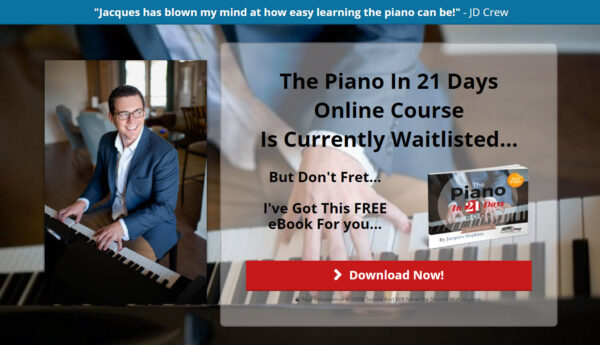
To create his opt-in pages, launch sequence pages, and sales pages, he uses a hosted service called ClickFunnels.
“ClickFunnels has the best page editing software I’ve seen,” he says. “I’ve used LeadPages, ThriveThemes, OptimizePress – all have definite pros – but in terms of being able to quickly create a beautiful landing page, ClickFunnels is my favorite.”
He also uses the service to manage the membership side of his site. “ClickFunnels has a great membership tool built in and also connects to Stripe to help me process payments,” he says.
Mentors and Inspiration
Hopkins is thankful for several mentors along the way. One popular influencer who has helped him in particular is Dean Dwyer, author of Make Shift Happen.
“I emailed him one day with a question thinking it was unlikely he’d respond,” he says. “Not only did he respond, but he asked if I wanted to jump on a Skype call with him. We’ve since talked on Skype several times and I always walk away from those conversions with great advice.”
“Some people I’ve never talked to but have learned from include Pat Flynn, Jeff Walker, and David Siteman Garland,” he says.
Advice to New Online Entrepreneurs
Make Sure You Have a “Hook”:
If I just taught piano lessons like everyone else does then my stuff would just get lost out there. My hook is that you’re going to learn quickly, not have to deal with all the BS music theory that normally comes with piano lessons — and you’ll learn pop songs, not the classical stuff.
Outsource as Much as You Can:
At first I did literally everything myself. If you can afford it, get someone to build web pages, get someone to produce videos, etc. Upwork and Fiverr are essential to my business now.
Figure Out Your Motivation and Be Honest With Yourself:
At first, I just wanted to make money online. Someone would buy my course and I’d check my bank account and see it grow. It was very impersonal. Now, I genuinely want success for my students. I’m continually following up with everyone and seeing what I can do to help them be successful.
Never Stop Learning:
At first you’ll have to learn about building websites, internet marketing, etc. But what I’ve found that’s truly important is to never stop learning your craft. For awhile I thought I already knew everything about piano that I wanted to teach others, but as Ryan Holiday says: “ego is the enemy.” Now I spend a lot of time trying to get better on the piano myself.
For Hopkins, having an online business has given him both financial freedom and the free time to travel with his young family. “The fact that I can help people and make money at the same time is amazing,” he says.
Tools He Mentions…
People He Mentions…
- Dean Dwyer – Make Shift Happen
- Tim Ferriss – The 4-Hour Workweek
- Pat Flynn – Smart Passive Income
- David Siteman Garland – The Rise To The Top
- Ryan Holiday – Ego Is The Enemy
- Steve Nixon – FreeJazzLessons.com
- Jeff Walker – Product Launch Formula
About Jacques Hopkins…
Matt Thomas
Latest posts by Matt Thomas (see all)
- 10 Blogging Coaches and Mentors to Help You Jumpstart Your Blog and Make Money - September 11, 2019
- How Blogger Tom Dupuis Earns $100K+ Per Year Creating SEO Tutorial Posts - June 28, 2018
- The 5 Biggest ‘Talking Head’ Video Mistakes - October 17, 2017


Nice article. Thanks for sharing it.
Spent well over two hours today listening to his hard sell about his own genius, and his it’s so amazing it’s worth 3k, but as a special offer it’s only 500 dollars or whatever if you sign up now. He’s likeable enough with cute photos of his kids and his compelling back story, but be aware. He isn’t offering anything truly new. Find a decent piano tutor, try a few to find one that suits, and ask them to teach you chord progession on the piano. The cost of this course wound give you probably 15-20 hours of one-to-one tuition which I have little doubt would get you a fair bit forward. The idea that chords are used as a shortcut to learning the piano is simply a hook, it’s a standard technique. The rest seems to be marketing. I have no hesitation in discussing it further.